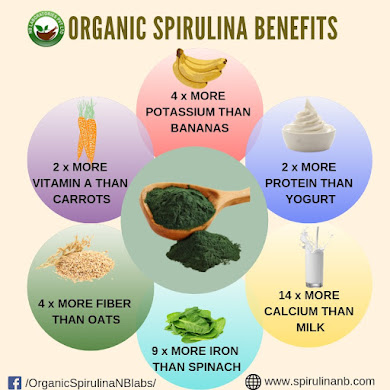Algae-Whizz! Spirulina's Plethora of Health Benefits
The
health benefits of Spirulina are legendary. Antioxidants and vitamins abound in
this particular strain of algae. Supplement proponents love to include it in
tablets, pastes, and powders of all kinds. Get it from Spirulina Capsules
Manufacturers. You can contact them by searching SpirulinaTablets Manufacturer in India.
1. Spirulina is a nutrient-packed food.
Spirulina's
high nutritional content means that you obtain a lot of nutrients for your calorie
expenditure.
Spirulina's
actual vitamin content will depend on how you consume it. If you want to get a
sense of how much nutrition is in a 7-gram portion of dried Spirulina, here is
the nutritional punch:
That's a
decent amount of goodness for just 20.3 calories, even if you don't meet your
DV for any of these nutrients.
As a
result, spirulina pills are top-rated among those interested in healthy diets.
Spirulina goods vary widely in their nutritional content, so it's essential to
look at the components before buying. Make careful to compare the quantity you
receive to the daily values for your age, gender, and pregnancy status.
2. The antioxidant and anti-inflammatory
effects of Spirulina are well-known.
Oxidative
stress occurs when your DNA and cells are damaged over time by oxygen. However,
it doesn't resemble the rust accumulated on your bike over the winter. You
don't want to deal with the long-term effects of chronic inflammation, cancer,
and other disorders.
Antioxidants
are well-known in the health community. Spirulina is an excellent source of
these antioxidants because it is so high in them.
Spirulina's
most crucial element is phycocyanin. Over the last decade, scientists have
explored its anti-inflammatory, antioxidant, and anticancer potential. Many
scientists believe it has great potential for application in pharmaceuticals in
the future.
A small
body of research supports the antioxidant and anti-inflammatory properties of
Spirulina. Since anti-inflammatory and antioxidant medications made from
phytocyanin are still a ways off, Spirulina could serve as an interim solution.
Spirulina may be an alternative if you're concerned about oxidation (or merely
have inflammation-related discomfort).
The
antioxidants you'll find in your fruits and vegetables, on the other hand, are
far less expensive, so don't fret if money is tight.) You can, however, avoid
the oxidative stress that comes with it.)
3. Spirulina has been shown to lower
"bad" cholesterol levels.
This is
because low-density lipoprotein (LDL) isn't intrinsically evil, hence the
quotation marks around "bad." In the wrong amount, they might be
detrimental to a person's health. No, we aren't aiming to get rid of them.
Making ensuring we have enough "good" high-density lipoprotein (HDL)
to counterbalance the bad stuff is all that matters.
4. Spirulina prevents the oxidation of
"bad" cholesterol.
Don't
worry if you're a little lost. Spirulina, as you may recall, can reduce LDL
cholesterol levels. Just as crucial, though, is the protection of the remaining
"bad" cholesterol.
It would
help if you had *some* LDL cholesterol in your circulation. The risk of heart
disease can also be present in people with normal LDL levels. A fundamental
reason that many persons acquire heart disease (especially atherosclerosis, the
stiffening of blood vessels) is the oxidation of LDL cholesterol in their
blood.
5. Spirulina may be anticancer in nature
Many
studies are currently being conducted on Spirulina as a potential base for an
anticancer medication. Recent research shows that spirulina extract is
effective against several types of cancer, including lung and liver cancer (but
only when studied in vitro and using rats; human trials are required before
fully promoting Spirulina as an anticancer therapy). Contact the BestSpirulina Manufacturers now!


Comments
Post a Comment